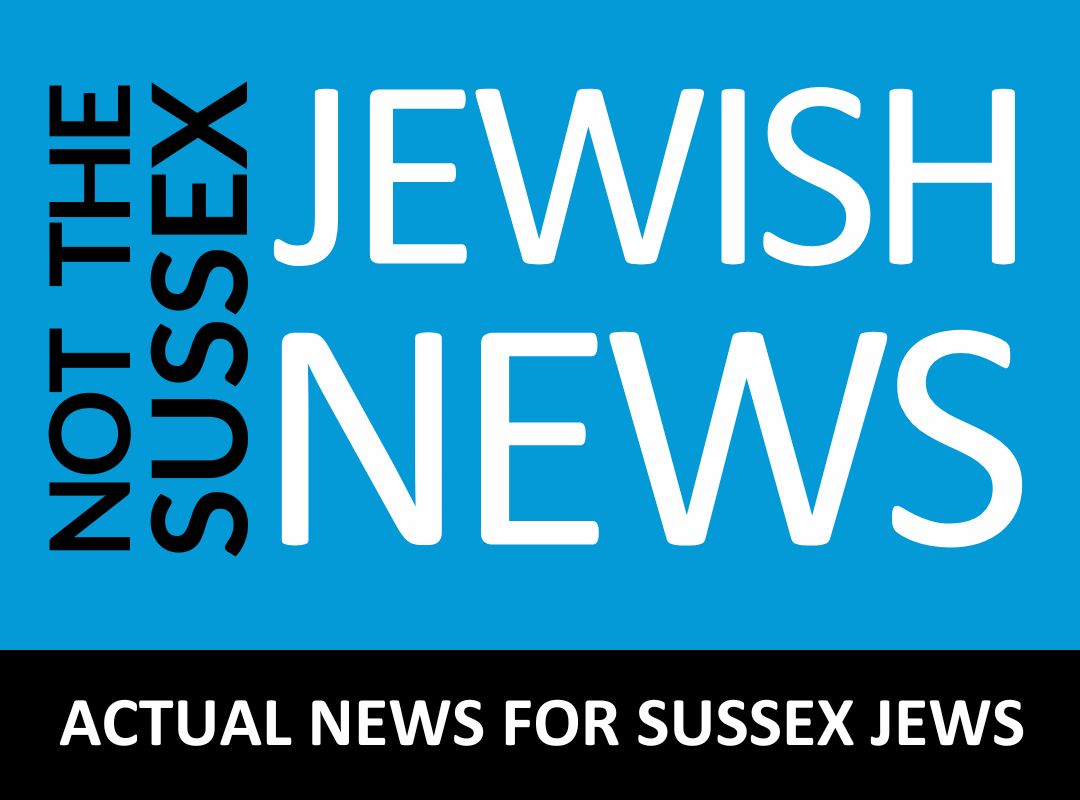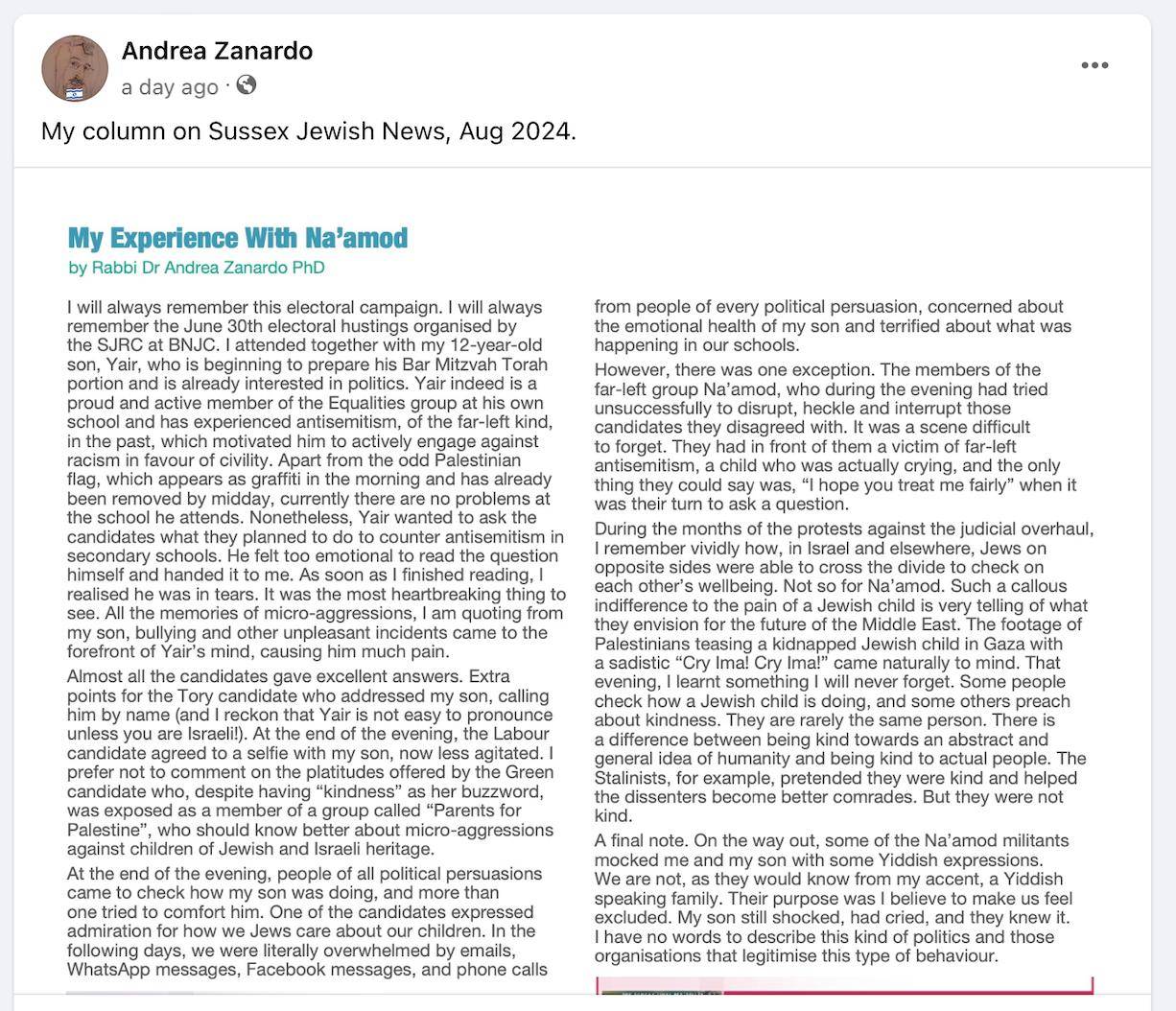In the weeks leading up to the election the BJNC Jewish Community centre in Brighton & Hove held a hustings, one of a number across the country organised by the Board of deputies of British Jews. A group of us – some from Na’amod, others from Brighton & Hove Jews against the occupation (JATO ) applied to attend.
Shortly after the hustings this article appeared in Sussex Jewish News, written by Rabbi Andrea Zanardo of Brighton and Hove Reform synagogue who also posted it on his facebook page which is where I saw it.
I took exception with the fact that he accused us of heckling and that we had racially abused him
and his son so I reached out to him through social media:
“Dear Rabbi, My name is Alan Schechner. I am not a member of Na’amod but did attend the
hustings and I read with some dismay your version of events in the SJRC newsletter. I would like
to meet with you to explain what I saw and heard. Like you I have Israeli citizenship and lived
there for many years, serving in the army, living in the occupied territories at one point and at
another point living in an Arab village, I am saddened by what seems to me to be your attempts to
vilify those us who dont share your views on Israel. I would love this to be an opportunity to open
dialogue, Jew to Jew, Israeli to Israeli. I am not an aggressive or violent man and I am not looking
for arguments but a willingness to dialogue. I hope that you will grant this request. Yours. Alan
Schechner.” I provided my email for him to respond.
He never responded so I wrote a letter to the Sussex Jewish news instead. They took some time
in responding but asked if we could have a telephone call which we did in in September. In the
call they said they didnt think it was appropriate for me to respond in a letter but instead they would like me to write an article. They said they welcomed my article and would welcome ongoing guest columns from people in the community with a range of views and they are trying to encourage honest and open debate.
I sent my article in on 17th September 2024:
Building Bridges Amid Divisions: A Call for Dialogue in Our Jewish Community
By Alan Schechner
In the wake of the recent article, My experience with Na’amod, featured in Sussex Jewish News, I felt compelled to share my perspective and, more importantly, my story. This is not just an abstract discussion for me; it’s deeply personal. My family lost a nephew, Nehorai Sa’id, on October 7th. He was killed by Hamas while trying to protect his family and community. This loss shapes my commitment to seeking peace, understanding, and unity in our fractured world.
I want to clarify that while I am not a member of Na’amod, I did attend the hustings mentioned in the article. I believe I am the person referred to when accusations were made about certain interactions at the event. I was accused of callous indifference towards the pain of a Jewish child. Further, this was equated with the horror of kidnapped Israeli children being taunted by Palestinians on October 7th. Such comparisons not only misconstrue my intentions but also miss a crucial opportunity for understanding and dialogue.
After the event, I reached out to the author of the article, Rabbi Zanardo, with the hope of clearing the air. My message was simple: I wanted to meet, Jew to Jew, Israeli to Israeli, to share what I experienced and to better understand his perspective.
I was disappointed not to receive a response. The absence of dialogue only reinforces the very divisions that continue to plague our community. We need to create spaces where people can respectfully disagree, especially within the Jewish community.
At the hustings, my goal was not to disrupt or heckle, as was implied. I raised my voice once, to support the Green Party candidate and clarify the goals of Parents for Palestine, a group committed to ending the siege and occupation in the region. However, I was taken aback by the hostile reception that I and others received. We were called “disgusting” and “traitors” and filmed aggressively. This was a far cry from the welcoming environment promised on the BNJC website.
One of the more hurtful accusations was that I mocked the Rabbi and his son with Yiddish phrases. I want to set the record straight: the only thing I said to them was “B’hatzlacha,” a Hebrew word meaning “good luck.” This was a sincere and positive wish, not an attempt to mock, exclude, or disrespect anyone—least of all a child.
Equally troubling were the comments on the Rabbi’s Facebook page equating Na’amod and Jewdas with conspiracy theorists and anti-vaxxers, and suggesting that supporters of these groups are not “real Jews.” As someone who grew up in an Orthodox family, attended Jewish schools, and studied at Yeshiva in Israel, I know that this has no basis in Jewish law or tradition. Jewish identity is enduring, even in cases of conversion or heresy. The notion that political disagreements could strip someone of their Jewishness is deeply concerning.
Rabbi Zanardo has every right to hold and express his political views. But as a leader within our community, he also has a responsibility to foster inclusion, not division. Judaism has long thrived on debate, but that debate has always been grounded in mutual respect. When we demean fellow Jews or question their Jewishness, we cross a line that undermines the very fabric of our community.
I am heartbroken by the anti-Semitism that the Rabbi’s son faced in his school. No child should experience such hatred, and I would never support or tolerate any form of discrimination. At the hustings, I heard no anti-Semitic or anti-Sephardic remarks. My wish for his son, “B’hatzlacha,” was genuine and well-intentioned.
I renew my invitation to Rabbi Zanardo for a conversation. I also extend that invitation to anyone in our community who is willing to engage in respectful dialogue.
Now, more than ever, we need to come together. We need to create spaces where every Jew feels welcome, no matter their political beliefs. And we need to remember that our shared identity, our shared values, and our shared history as a people are far more important than the differences that divide us.
Let’s choose dialogue over division. Let’s choose understanding over alienation. And let’s work together to build the compassionate, inclusive community that we all desire.
On the 7th November having not heard anything I reached out asking about the status of the article and on 9th November I received an email saying that the article had been accepted:
“Hi Alan.
We will be running your article in the next issue of SJN.
Could you please EMAIL me a photo of yourself to accompany it — and provide a tag line as to how you would like to be identified?
Many thanks & Shabbat shalom,”
The later that same day I received the following email:
“Hi Alan,
After further deliberation, the editorial board of Sussex Jewish News has decided not to publish the article as submitted.”
I responded immediately:
“I am a little confused. In our phone discussion you stated that the SJN would welcome ongoing guest columns from people in the community with a range of views and they are trying to encourage honest and open debate. What has changed?
Are there some changes you would like me to make in order to facilitate publication.
Many thanks
Alan”
And then, hearing nothing I emailed again on 12th November:
“To the editorial board of the Sussex Jewish News,
Since I have not had a response to my last email sent on November 9th I am taking this opportunity to write to you again.
It was quite shocking to receive two emails sent on the same day one telling me that my article would be included in the next issue of SJN and then one, 5 hours later, stating that it was not to be published.
My article, and my initial attempt to reach out to Rabbi Zanardo were both attempts at reconciliation, clarifying my understanding of what had happened on the night of the Hustings and attempting to open up pathways to dialogue.
In my phone call with Winston Pickett on the 17th September he stated that the SJN wanted to include and represent a range of diverse views from within the community and encouraged me to turn the original letter I had written into an article. It now seems by your decision that this is not something that you want.
Instead you seem to be content to allow a Jewish man to be accused of racism in the pages of your publication, without doing any due diligence as to the accusation and then withdrawing his right to respond to those accusations. If the publication was not a Jewish one and it acted in this way I am sure you would be amongst the first to accuse it of antisemitism.
I now have two options moving forward. The first, and my preferred one is to ask you to reconsider your cancellation of my article and to publish it as promised in the hope that bridges can be built and dialogue can flow between all of the Jews of Brighton and Hove, irrelevant of their level of religious observance or their political views. The article I submitted was written in an attempt to facilitate reconciliation and this is still my main driver.
Option two, should you refuse to publish the article would be me reaching out to other publications and organisations to tell them the story of how the Brighton and Hove Jewish community refuses to engage in dialogue, “others” Jews who do not align to certain belief systems and allows one of it’s Rabbis to defame a Jewish man and various Jewish groups with no proof and with no opportunity for those defamed to respond.
The BNJC on it’s website claim to be a “forward-thinking Jewish Community hub for all” where “everyone is welcome” and whose mission is to “support Jewish life across the spectrum”.
Similarly the SJN claims to be a “publication of Jewish interest covering communal, media, culture and items of general interest for all the community whatever their affiliation.”
My hope is that by agreeing to publish my article you can live up to your missions, and more importantly that free and respectful speech can thrive across our community.”
I received this response on November 14th:
“Thank you for your recent communications re your article.
The SJN Editorial Board has made its decision regarding publication of your recent article and I would point you to the guidelines, published on page 3 of every issue of SJN, which clearly state the following:
We welcome readers’ contributions but reserve the right to edit, cut, decline or submit the content to others for comment.
We do not have to explain our reasons for declining to publish your article.
Should you wish to build bridges, I suggest that you might also wish to let sleeping dogs lie.”
My final email was sent that same day:
“Under normal circumstances I would agree that you do not need to give reasons for declining my article but these are not normal circumstances. In my phone call with Winston Pickett SJN requested that I write the article, they then accepted the article and then chose to decline it.
Surely that deserves some explanation?”
I havent heard anything from Sussex Jewish News since.

